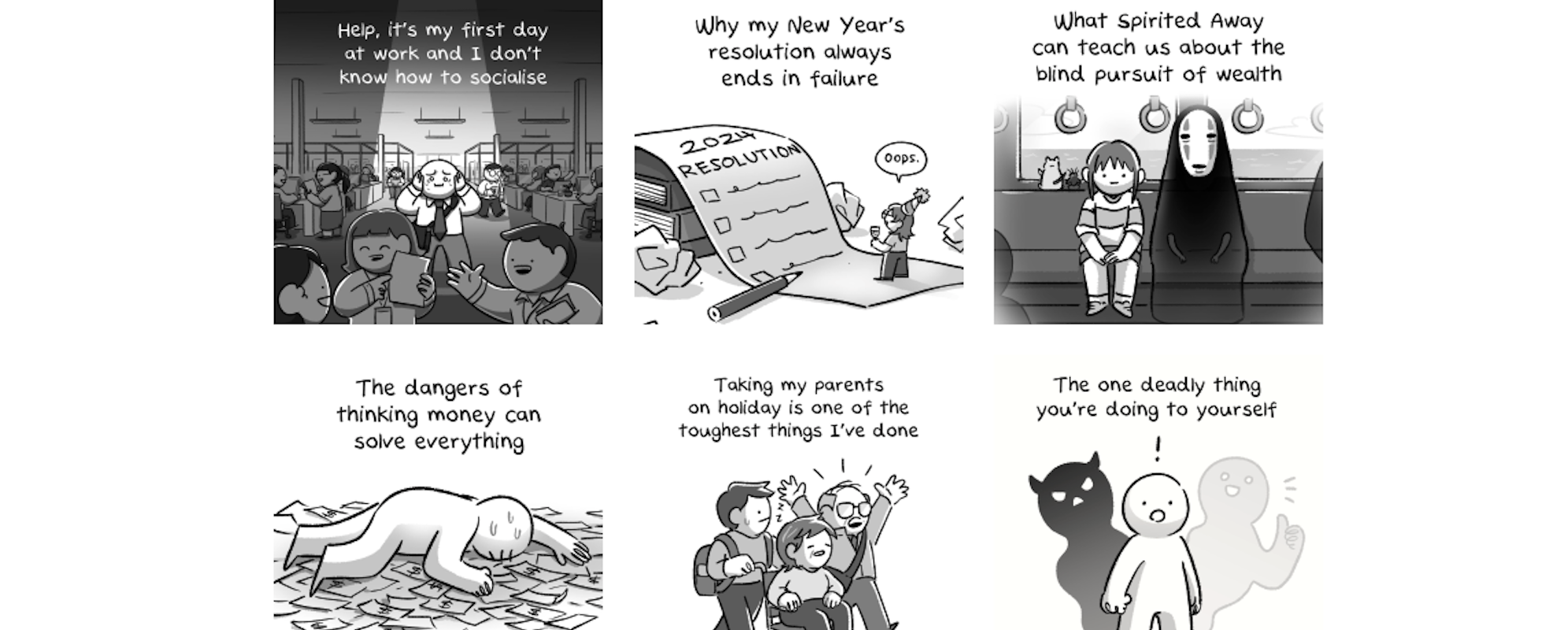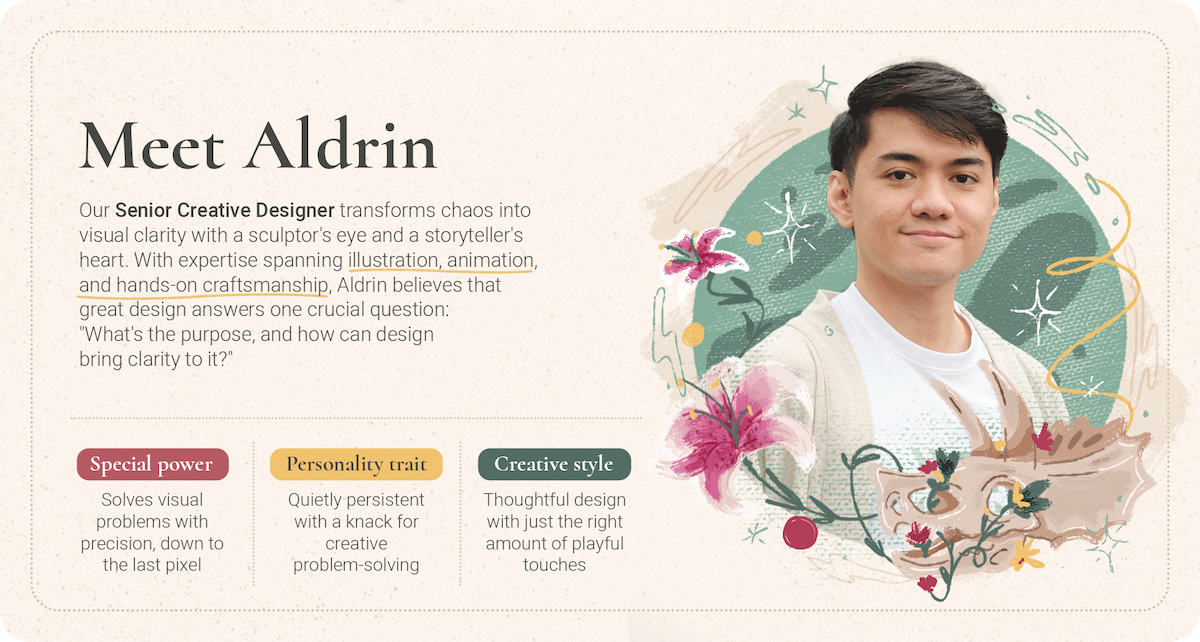
“We want to create ‘echo-chamber-busting’ content, if you will,” says He Ruiming, who founded personal finance content powerhouse The Woke Salaryman along with visual storyteller Wei Choon Goh.
“If we keep reaching out to people, I feel like one day there will be a future change-maker who aligns with our values and — who knows — they might change the world.”
The Woke Salaryman is among the top personal finance blogs in Singapore. Well-known for its comic-book-style content, it touches on the relationship between people and money — everything from growing your savings and retiring early to dealing with burnout and moving abroad.
The Woke Salaryman has been in the content marketing scene since 2019. The last time we spoke to the duo in 2020, they had over 170,000 followers on Facebook and 115,000 on Instagram. They’ve since tripled their followers on each platform.
After amassing such a following, Ruiming and Wei Choon had to reckon with the ups and downs of having such an influence — from the pressure of creating fresh and engaging content to the threat of artificial intelligence to staying true to themselves amid the noise, contention, and echo-chambers of the internet.
Here’s how they navigate modern content marketing.
Authenticity = The key to creating content that resonates
One of the basic tenets of successful content marketing is creating relevant content. “Relevant” can come in different forms. For example, it could be helpful content that answers a customer’s wants, needs, or pain points. Or it could be entertaining content that piques a customer’s interests or emotions.
But another tenet of content marketing that is arguably more difficult to achieve, and something that The Woke Salaryman does well, is creating authentic content. In other words, content that is honest, relatable, and forms strong connections with the audience.
A good example is their recent comic “I relied solely on work to give my life meaning. Here’s where it got me.” It depicts the struggle of conflating career with identity; of allowing your job to consume most of your waking hours. With Singapore being the most overworked country in Asia-Pacific, this was a very relatable struggle for readers.
This was the company’s best-performing webcomic of all time.
“We weren’t expecting it to do so well. In fact, it sat for like four months in our content bank and we just decided to publish it because we had a delayed publication that week. So we put it out with no expectation. Now it has 300,000 views, which is pretty insane,” says Ruiming. The comic also got over 300,000 likes and almost 1,000 comments on Instagram and around 3,000 likes and shares and 58 comments on Facebook.
Authentic content distinguishes itself from generic information circulating online. Since products and services aren’t inherently unique, one of the best ways to differentiate brands through content marketing is to tap what makes them unique: their people.
All companies have people, leaders, or experts who can provide insights, opinions, and experiences unique to them. Brands that leverage such people can bring something new to the table.
Even though The Woke Salaryman is a finance blog, the creators draw inspiration from their personal experiences, which inevitably results in content that resonates.
“Money fits into so many things in life,” says Ruiming. “We’ve moved onto stuff like mental health, wellbeing — way beyond the original scope.”
The Woke Salaryman also has a strong brand voice. If you’ve come across one The Woke Salaryman comic, you’ll recognize another one right away. They use simple, concise language against equally simple, black-and-white cartoon-style illustrations.
The brand’s voice and content are also unapologetically Singaporean. This is evident in the language they use and topics they cover — stories about road trips to Malaysia, buying an HDB flat, being kiasu, and experiences during national service.
When I asked Ruiming whether the changing context of the word “woke” affected their readership, he said:
“We try not to be influenced by events in the West. We believe that as Asian creators, we are free to use whatever meaning we want or find a word in whatever suits our context… I don’t like the idea of changing just because people in the West don’t like it… We’re open to change, but it has to be driven from somewhere that resonates with our audience.”
Protect your values even if it means turning down lucrative work
The Woke Salaryman adheres to these tenets of good content marketing especially when it comes to sponsored content. Ruiming says the content they make for partners needs to be good enough to be published on The Woke Salaryman, even without a sponsorship. This, admittedly, makes the whole money-making process harder.
“We argue with our clients a lot. It makes the process very, very painful,” he says.
It takes the team about one month to produce a standard comic book. But when a client is involved, it can take anywhere from two to nine months depending on the stakeholders and requirements.
The Woke Salaryman’s creators are also very selective about the partnerships and projects they take on, and are not afraid to reject projects if they don’t align with their goals and values.
“There have been briefs where clients take a top-down approach. They give us a press release and ask us to summarize it into an infographic. I feel like that kind of plan, we reject, because it clearly shows that you’re just using us to get a message out without actually reading us in the first place. That’s not the kind of relationship we want,” explains Ruiming.
After all, platforms like The Woke Salaryman have more to lose if they publish below-standard content on their platform. Even if they make easy money early on, it may dilute their brand and affect their readership in the long run.
“If we were just a content house, we could create bad content and absolve ourselves from any responsibility. For ours, it’s different. It’s a platform. We have to defend the image of the platform or the optics of the platform quite vigorously,” he says.
“To create our best work, we have to believe in what our client is actually saying.”
In this regard, content marketing has been slow to progress. While there are more brands allocating bigger budgets to content marketing, many still tend to prioritize creating content that can inflate vanity metrics, like social media likes, comments, and followers, over creating authentic content.
While vanity metrics can make your brand look shiny and attractive, they may not necessarily translate to meaningful business impact — like building a loyal and engaged community. It’s sort of like clickbait, which entices readers to click on a headline but not take away anything after reading the article. In 2024, the rise of generative AI tools led to an avalanche of shallow, spammy programmatic content, and websites getting penalized by Google (and panned by their industry peers) as a result.
“[AI] has made it very easy to create content. It has lowered entry so much that there are so many people creating,” says Ruiming.
With more content to compete with online, the pressure is on for content creators to stand out. But the thing about AI is that it simply regurgitates the information it’s fed. So in a way, platforms like The Woke Salaryman have nothing to worry about.
“It’s the same, right? We just have to create content that no one else is creating,” says Ruiming.
“I think of AI as a form of mass manufacturing. You can buy vases from Daiso for as low as two dollars in Singapore. But you might also fork out 5,000 for a designer vase. What makes it different? Both vases store water and you can put flowers in them but one has the intangibles. You have to work on the intangibles if you really want to start as a content creator.”
And how do you find that intangible? Ruiming says you must “strive to be a real person as much as possible. Sometimes, being a real person means not being perfect; having flaws, as well. Whether in writing or art.”
Pick a side and embrace the haters
With about a million followers collectively on Instagram and Facebook, The Woke Salaryman was bound to step on some toes. “We do create content that makes people want to unfollow us,” says Ruiming.
A controversial issue was one about a man who complained that every company he worked for had a toxic work culture. At the end of the strip, The Woke Salaryman challenged readers to consider whether it was their workplace that was toxic, or them.
The post sparked a lot of debate and some unfollows. Ruiming and Wei Choon welcome that.
For The Woke Salaryman, neutrality is the enemy. Their web comics reflect their values, formed by experience and careful deliberation over certain topics. Ruiming says that much of their content is inspired by books, conversations, and online forums — specifically “the most upvoted comment I disagree with.” The result is content that picks a side.
“It has never been a numbers chase for us. Our idea was always to curate an audience that can see multiple perspectives of a certain issue,” says Ruiming. If the content doesn’t get through to the audience, he encourages them to unfollow.
“It’s not about the audience, but the quality of the audience,” he says.
Most brands and content creators would shy away from such an approach. But the idea is that you can’t please everyone. Having half-baked, carefully neutral posts will only get you a “like” or “thumbs up” at best. But content with conviction nurtures communities.
“We want to reach as many people as possible with truthful, authentic, and helpful content in a world where media organizations are incentivized to sensationalize or create content that conforms to [a certain] worldview,” says Ruiming.
Of course, brand engagement isn’t a one-way street; it’s a conversation. While the founders take time to ensure that every piece is “well-rounded with many different perspectives,” one of their biggest challenges is setting their ego aside and listening with empathy.
“In the beginning, we’d just make an error and people would be angry with us and they would explain their perspective. And you had to have the humility to see that, actually, this person does make sense,” says Ruiming.
Because at the end of the day, the goal was and always has been about exploring and defining wealth.
“We hope our audience will be the next generation of leaders who can define what it means to be a wealthy person — a useful member of society and giving back to society in a bigger way instead of thinking of their own personal work,” says Ruiming.
Striving to be “real” in an era of AI and big-budget content marketing
In an era of AI and relentless KPI-chasing, the challenge for modern content marketers is to find that secret sauce that will make content stand out. And more often than not, the key is to remind ourselves of what makes us human, who we write for, and why we write.
—
200+ industry-leading tech companies in Southeast Asia are happy clients of With Content. Join them and start delivering valuable content to your potential customers today.



